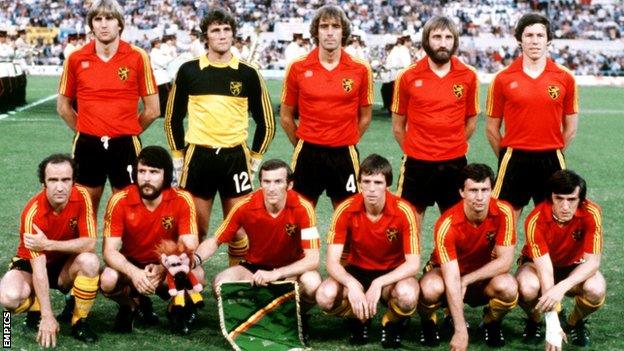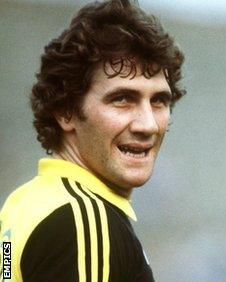Euro 1980: How Belgium defied the odds to reach final
- Published

Belgium, 1980
The European Championship has often been the platform for the continent's smaller nations to humble more traditional powers.
From Denmark in 1992, external to Greece in 2004,, external the competition's history is graced with fairytale-like stories of underdogs punching above their weight.
Before the European Championship in Italy in 1980, Belgium had won just two matches in international tournaments.
Qualification often seemed a challenge in itself, until a golden generation of players evolved into a team able to compete with the very best.
Under the management of Guy Thys, players like goalkeeper Jean-Marie Pfaff, right-back Eric Gerets, midfielder Jan Ceulemans and, a couple of years later, playmaker Enzo Scifo helped a team from the Lowlands to scale unthinkable heights.
And it all started with their run to the final of Euro 1980.
"We worked for six or seven years to build that team," said Pfaff, who would later be named one of the best 125 players of all time by Pele., external
"It was certainly one of the best Belgium teams we have produced. This was the first time we had reached the final - before then, we were amateurs.
"We had some good players, but not a good team, and then the individual players, like Ceulemans, Gerets and Rene Vandereycken, worked hard on discipline and it all came together in our first game against England."

Jean-Marie Pfaff
That first game, on 12 June 1980,, external was memorable for more than one reason, with the local police being forced to use tear gas on the rioting English fans in the stands.
Ceulemans earned Belgium a draw, cancelling out a rare Ray Wilkins goal - he only scored three times in 84 appearances for his country - to give the Red Devils belief heading into their other group games against Spain and Italy.
"They had Kevin Keegan, lots of top players, and everyone said before the game that England would win by four or five goals - but it ended 1-1," Pfaff told BBC Sport.
"After that game we had the motivation and the mentality to go into the next game. When you play well, you get momentum and confidence."
Spain were beaten 2-1 and, with England suffering a 1-0 defeat by Italy, it meant Group B would be decided in Rome when surprise package Belgium took on Italy.
The Belgians set their stall out for the draw which would take them to the final - and they pulled it off.
It meant they faced the might of West Germany in the final, who qualified unbeaten from a group containing Czechoslovakia, the Netherlands and Greece.
When Vandereycken converted a penalty in the 75th minute of the final,, external to cancel out Germany's first-half opener, the momentum looked like it was beginning to shift Belgium's way.
However, this was one dream which was not to be, as Horst Hrubesch scored his second goal of the game in the 88th minute to finally end Belgian resistance.
"In the final, we were very happy just to be there for the first time," said Pfaff. "We worked hard for our success, our money and our family.
"We played as a team, and not as individuals. We had lots of heart - that was important.
"We were a little bit like Denmark, who won the tournament 10 years later.
"We certainly did not expect to get to the final. We achieved it by working for success, team spirit and the country's identification.
"When we got back to Belgium, we realised everyone in the country was happy."
This was only the beginning for Belgium, however, and they topped a group including Diego Maradona's Argentina at the 1982 World Cup before being beaten by Poland and the Soviet Union in the second group phase, and they reached the semi-finals of the 1986 World Cup.
So, does Pfaff believe Belgium's current side, who have not qualified for this summer's European Championship, can ever battle their way back to the top?
"We have the same amount of good players, and they play at top clubs like Arsenal (Thomas Vermaelen), Manchester City (Vincent Kompany) and Ajax (Jan Vertonghen)," said Pfaff, who saw the world goalkeeper of the year award created on the back of his performances in 1986.
"We have many good, young players who play in great teams and earn big money but, at the moment, they have not been a good team.
"This year, I think they are coming together as a team. Maybe they can do what we did in the 1980s one day soon."